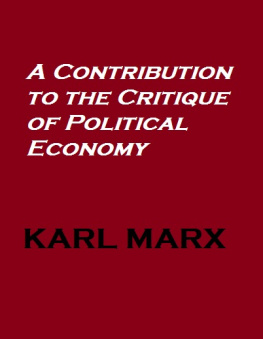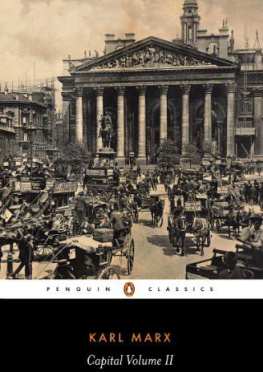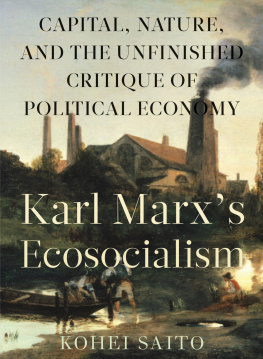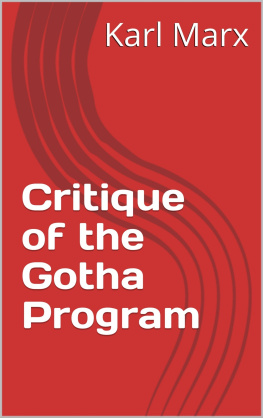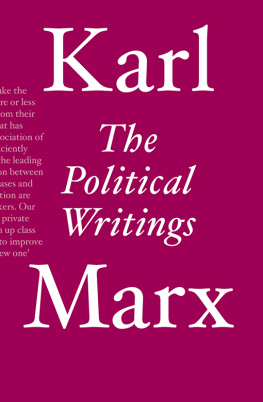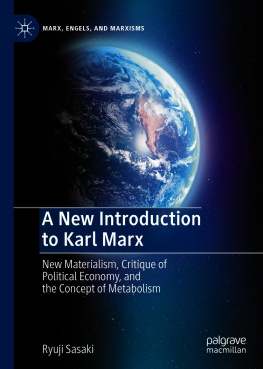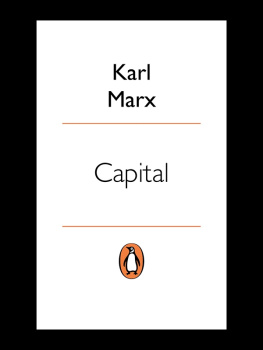Karl Marx - A Contribution to the Critique of Political Economy
Here you can read online Karl Marx - A Contribution to the Critique of Political Economy full text of the book (entire story) in english for free. Download pdf and epub, get meaning, cover and reviews about this ebook. year: 2011, genre: Romance novel. Description of the work, (preface) as well as reviews are available. Best literature library LitArk.com created for fans of good reading and offers a wide selection of genres:
Romance novel
Science fiction
Adventure
Detective
Science
History
Home and family
Prose
Art
Politics
Computer
Non-fiction
Religion
Business
Children
Humor
Choose a favorite category and find really read worthwhile books. Enjoy immersion in the world of imagination, feel the emotions of the characters or learn something new for yourself, make an fascinating discovery.
- Book:A Contribution to the Critique of Political Economy
- Author:
- Genre:
- Year:2011
- Rating:4 / 5
- Favourites:Add to favourites
- Your mark:
- 80
- 1
- 2
- 3
- 4
- 5
A Contribution to the Critique of Political Economy: summary, description and annotation
We offer to read an annotation, description, summary or preface (depends on what the author of the book "A Contribution to the Critique of Political Economy" wrote himself). If you haven't found the necessary information about the book — write in the comments, we will try to find it.
A Contribution to the Critique of Political Economy — read online for free the complete book (whole text) full work
Below is the text of the book, divided by pages. System saving the place of the last page read, allows you to conveniently read the book "A Contribution to the Critique of Political Economy" online for free, without having to search again every time where you left off. Put a bookmark, and you can go to the page where you finished reading at any time.
Font size:
Interval:
Bookmark:
Written: 1859
Publisher: Progress Publishers, Moscow
First Published: 1859
Translated: S.W. Ryazanskaya
On-Line Version: Marx.org 1993 (Preface, 1993), Marxists.org 1999
Transcribed: Tim Delaney, Zodiac;
Proofed: and corrected by Matthew Carmody 2009;
eBook prepared by: J Eduardo Brissos 2011.
Chapter 1:
Note A.
Chapter 2:
Note B.
a)
b)
c)
a)
b)
c)
Note C.
Appendices
INTRODUCTION by Karl Marx
I. (Circulation)
a.
b.
c.
REVIEW by Frederick Engels
II.
Marx Engels Archive
Source: K. Marx, A Contribution to the Critique ofPolitical Economy, Progress Publishers, Moscow, 1977, with some notes by R. Rojas.
I examine the system of bourgeois economy in the following order: capital, landed property, wage-labour; the State, foreign trade, world market.
The economic conditions of existence of the three greatclasses into which modern bourgeois society is divided are analysedunder the first three headings; the interconnection of the other threeheadings is self-evident. The first part of the first book, dealingwith Capital, comprises the following chapters: 1. The commodity, 2.Money or simple circulation; 3. Capital in general. The present partconsists of the first two chapters. The entire material lies before mein the form of monographs, which were written not for publication butfor self-clarification at widely separated periods; their remouldinginto an integrated whole according to the plan I have indicated willdepend upon circumstances.
A general introduction, which I had drafted, is omitted, since onfurther consideration it seems to me confusing to anticipate resultswhich still have to be substantiated, and the reader who really wishesto follow me will have to decide to advance from the particular to thegeneral. A few brief remarks regarding the course of my study ofpolitical economy are appropriate here.
Although I studied jurisprudence, I pursued it as a subjectsubordinated to philosophy and history. In the year 1842-43, as editorof the Rheinische Zeitung, I first found myself in the embarrassingposition of having to discuss what is known as material interests. Thedeliberations of the Rhenish Landtag on forest thefts and the divisionof landed property; the official polemic started by Herr von Schaper,then Oberprasident of the Rhine Province, against the RheinischeZeitung about the condition of the Moselle peasantry, and finally thedebates on free trade and protective tariffs caused me in the firstinstance to turn my attention to economic questions. On the otherhand, at that time when good intentions to push forward often tookthe place of factual knowledge, an echo of French socialism andcommunism, slightly tinged by philosophy, was noticeable in theRheinische Zeitung. I objected to this dilettantism, but at the sametime frankly admitted in a controversy with the Allgemeine AugsburgerZeitung that my previous studies did not allow me to express anyopinion on the content of the French theories. When the publishers ofthe Rheinische Zeitung conceived the illusion that by a morecompliant policy on the part of the paper it might be possible tosecure the abrogation of the death sentence passed upon it, I eagerlygrasped the opportunity to withdraw from the public stage to my study.
The first work which I undertook to dispel the doubts assailing me wasa critical re-examination of the Hegelian philosophy of law; theintroduction to this work being published in the Deutsch-FranzosischeJahrbucher issued in Paris in 1844. My inquiry led me to theconclusion that neither legal relations nor political forms could becomprehended whether by themselves or on the basis of a so-calledgeneral development of the human mind, but that on the contrary theyoriginate in the material conditions of life, the totality of whichHegel, following the example of English and French thinkers of theeighteenth century, embraces within the term civil society; that theanatomy of this civil society, however, has to be sought in politicaleconomy. The study of this, which I began in Paris, I continued inBrussels, where I moved owing to an expulsion order issued by M.Guizot. The general conclusion at which I arrived and which, oncereached, became the guiding principle of my studies can be summarisedas follows.
In the social production of their existence, men inevitablyenter into definite relations, which are independent of their will,namely relations of production appropriate to a given stage in thedevelopment of their material forces of production. The totality ofthese relations of production constitutes the economic structure ofsociety, the real foundation, on which arises a legal and politicalsuperstructure and to which correspond definite forms of socialconsciousness. The mode of production of material life conditions thegeneral process of social, political and intellectual life. It is notthe consciousness of men that determines their existence, but theirsocial existence that determines their consciousness. At a certainstage of development, the material productive forces of society comeinto conflict with the existing relations of production or thismerely expresses the same thing in legal terms with the propertyrelations within the framework of which they have operated hitherto. From forms of development of the productive forces these relations turninto their fetters. Then begins an era of social revolution. Thechanges in the economic foundation lead sooner or later to thetransformation of the whole immense superstructure.
In studying such transformations it is always necessary to distinguish between thematerial transformation of the economic conditions of production, whichcan be determined with the precision of natural science, and the legal,political, religious, artistic or philosophic in short, ideologicalforms in which men become conscious of this conflict and fight it out.Just as one does not judge an individual by what he thinks abouthimself, so one cannot judge such a period of transformation by itsconsciousness, but, on the contrary, this consciousness must beexplained from the contradictions of material life, from the conflictexisting between the social forces of production and the relations ofproduction. No social order is ever destroyed before all theproductive forces for which it is sufficient have been developed, andnew superior relations of production never replace older ones beforethe material conditions for their existence have matured within theframework of the old society.
Mankind thus inevitably sets itself onlysuch tasks as it is able to solve, since closer examination will alwaysshow that the problem itself arises only when the material conditionsfor its solution are already present or at least in the course offormation. In broad outline, the Asiatic, ancient, feudal and modernbourgeois modes of production may be designated as epochs markingprogress in the economic development of society. The bourgeois mode ofproduction is the last antagonistic form of the social process ofproduction antagonistic not in the sense of individual antagonismbut of an antagonism that emanates from the individuals' socialconditions of existence but the productive forces developing withinbourgeois society create also the material conditions for a solution ofthis antagonism. The prehistory of human society accordingly closeswith this social formation.
Frederick Engels, with whom I maintained a constant exchange of ideasby correspondence since the publication of his brilliant essay on thecritique of economic categories (printed in the Deutsch-FranzsischeJahrbcher,
Font size:
Interval:
Bookmark:
Similar books «A Contribution to the Critique of Political Economy»
Look at similar books to A Contribution to the Critique of Political Economy. We have selected literature similar in name and meaning in the hope of providing readers with more options to find new, interesting, not yet read works.
Discussion, reviews of the book A Contribution to the Critique of Political Economy and just readers' own opinions. Leave your comments, write what you think about the work, its meaning or the main characters. Specify what exactly you liked and what you didn't like, and why you think so.

